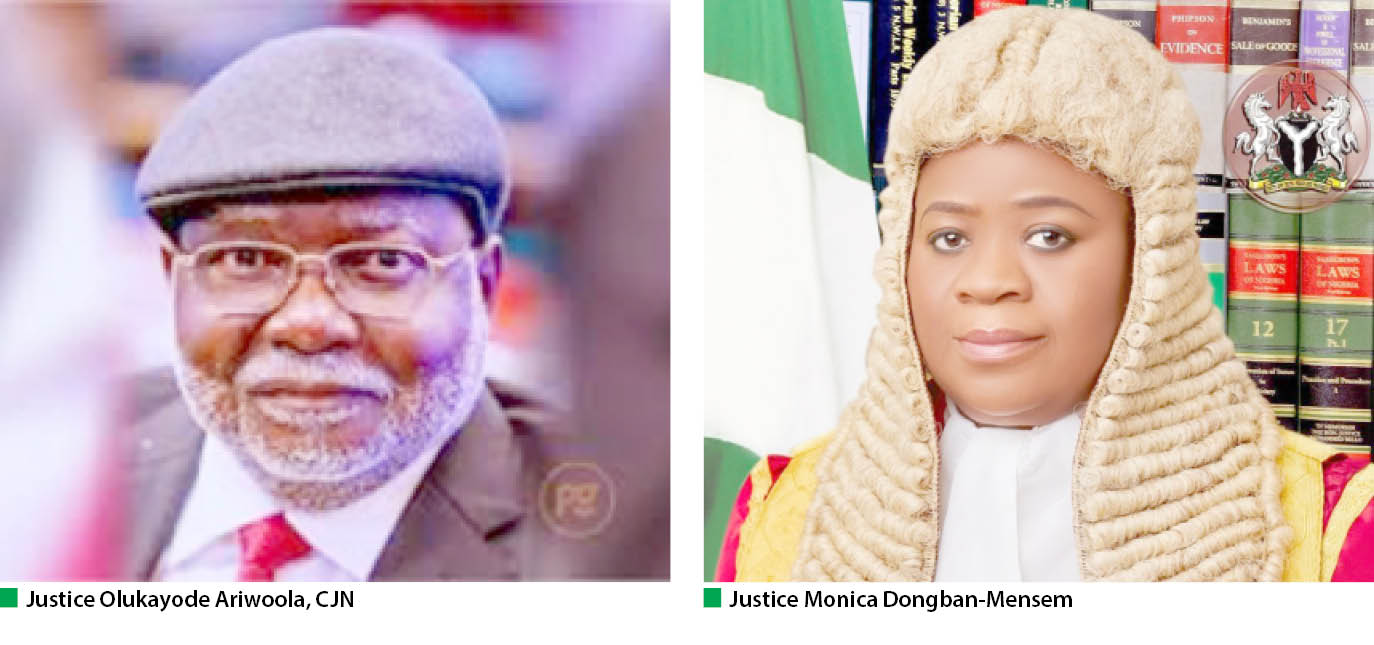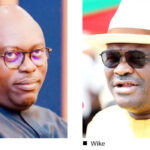Lawyers and analysts have reacted to the proposed amendments to laws involved in the 2023 general elections after the judiciary’s recent workshop for the review of judicial performance in the election.
Two major issues arose from the speeches by the Chief Justice of Nigeria, Justice Olukayoode Ariwoola and the President of the Court of Appeal, Justice Monica Dongban-Mensem, which borders on the provisions of the electoral laws the judiciary seeks legislative amendment, and the place of public opinion in judicial determination.
Contrary to the PCA’s presentation, many Nigerians believe the main problem of the election relates to the failure to transmit results of the presidential election as the main flaw in the election and would prefer amendment to the provisions of Section 64(5) and (6) on electronic transmission and Section 24 of the Electoral Act, 2022, on rescheduling where violence erupts during an election.
Some aspects identified for legislative amendment
Earlier in her speech, Justice Dongban-Mensem listed sections of the law that she would like to see either amended or removed through the legislative process.
While stressing that the judiciary was still putting together materials to determine if and whether something went wrong in the election litigation and to correct it for future litigations, she listed the identified sections thus: Section 187 of the Constitution and sections 233, 246, 285 and Paragraph 85(2) of the Electoral Schedule.
“This workshop is important because we are dedicated to ensuring that our electoral process excels,” she said.
“We want to discuss what we found wrong with our legislation pertaining to this election having experienced the applied provisions.
“We can now say whether or not those provisions moved our electoral process forward.”
- Mixed feelings as new Kano mandatory premarital law comes into force
- New minimum wage, new productivity regime
Judiciary won’t be intimidated by public opinion
Speaking, the CJN highlighted the importance of the workshop while emphasizing that judicial officers are not intimidated by public opinions on their decisions.
“No doubt, the adjudication on the 2023 election petitions came with varied challenges that have to be critically assessed and reviewed in order to forge a much better way forward,” he said.
“As for those areas that our inadequacies are manifestly obvious, we have to properly address them and bring on board new methods and approaches that would whet our appetite for success.
“We must intensify efforts in engaging in those activities that will earn us more accolades than vilification.
“Besides, the kind of attention and emotions attached to political matters in this country have collectively made our work more excruciating, painstaking and sometimes, endangering, as we are occasionally exposed to threats, especially from some elements within the political fold.
“But like I would always say, no amount of threat or intimidation should make a thoroughbred judicial officer deviate from the law and pander to public sentiments and emotions which are often misplaced.”
2023 presidential election verdict
The Presidential Election Petitions Tribunal and the Supreme Court in their judgements after the 2023 election, supported the contention of the Independent National Electoral Commission (INEC) that direct electronic transmission of polling units’ results of the election was not compulsory.
The tribunal also ruled that the 88,000 blurred and mutilated polling unit results downloaded from IREV by the opposition parties were not demonstrated by INEC and therefore inadmissible in evidence.
The tribunal led by Justice Haruna Tsammani held that the electronic transmission of results was not mandatory by the provisions of Section 64(5) of the Electoral Act 2022, because INEC Regulation 92 allows different levels of results collation.
He said Section 47 of the Electoral Act 2022 mandates the presiding officer to use the smart card reader or any other technology to transmit results but was not specific on the technology.
He cited the judgments of the Federal High Court in Abuja and the Court of Appeal in Lagos between LP and INEC as tendered by the APC and Tinubu, which held that INEC has the discretion on how best to transmit its results, were binding, having not been appealed against by the LP.
The tribunal also dismissed the constitutional issues of dual citizenship, the 25 per cent requirement in the FCT, forfeiture, and majority of lawful votes as canvassed by President Bola Ahmed Tinubu’s opponents: Atiku Abubakar of the Peoples Democratic Party (PDP) and Peter Obi of the Labour Party (LP).
However, international observers of the 2023 presidential election, like the European Union and the ECOWAS Commission had in their reports criticised the lack of transparency by failing to transmit election results and the use of violence in the election.
‘Non-transmission of results marred 2023 election’
Reacting to the contention over the 2023 general elections, a professor of Political Science, Prof. Dung Pam Sha, said the non-transmission of the election results of the election was the main flaw in the election.
Addressing a multi-stakeholder dialogue on rebuilding trust in the electoral process and elections organised by the International Press Centre (IPC) in Kaduna on Thursday, he said trust had been eroded at some level in Nigeria such as delivery, capacity to deliver, trust of engagement with citizens, trust of integrity, transparency and accountability.
Lawyers who spoke to Daily Trust on Sunday also insisted that the reviews must be comprehensive and not selective to accommodate all the areas affected during the election.
Hameed Ajibola Jimoh Esq., said having preferential consideration of one law over another would not be good enough.
“Therefore, and to the extent of the above view, once the above sections of the law have been duly studied and considered to have created certain setbacks in electoral matters in Nigeria, all those provisions in both the 1999 Constitution of the Federal Republic of Nigeria and the Electoral Act (including that of the provisions of Section 64(5) of the Electoral Act, should be reviewed,” he said.
“This recommendation is also important because one law helps the other for a better democratic system in Nigeria and to accord with and assure as well as ensure free, fair and credible elections,” he added.
On his part, E.M.D. Umukoro Esq., said it is possible to have the results of elections transmitted right at polling units.
“If the banks with your ATM card anywhere you slot it can work, why is it that we are unable to do that in our elections?” he asked.
“If we are ready in Nigeria, we can get it done; if the government is ready to get it right, we will get it right.
“You can amend the laws as much as you like till the next 100 years, so long as the people are there to do evil and the government is not ready to take the bulls by the horns and do the right and ensure that justice is done, forget it even if all the sections are amended.”
He said the problem of Nigeria is not so much about bad laws but bad judicial officers.
Quoting Lord Denning, he said, even if you have very good laws but you have bad judges, they will always find a way to make something bad comes out of the good laws.
“It is just like the various forms of government done in this country like regional, parliamentary, presidential and the military and we have done what was called diarchy, that is the military and the civilians but at the end of the day, people keep complaining that it is not working,” he said.
“The United Kingdom has been in the parliamentary and they are doing well; Ghana, unitary system of government and they are doing well; the United States has been on presidential system and they are doing well. Why is it that we keep changing the various systems in Nigeria?
“It is because the people are not following the rules and they keep changing the goalpost in the middle of the game.”
We need to rebuild public trust – Yiaga Africa
Reacting to the 2023 election reforms, the executive director of Yiaga Africa, Samson Itodo, stressed the importance of trust to be rebuilt in Nigeria’s electoral process after the last general elections.
He said trust in the electoral process is the bedrock of democratic legitimacy, requiring greater transparency and accountability for all election stakeholders, although some strides were made with the BVAS.
“We encourage INEC to continue to strive for greater transparency and regular public engagement, to rebuild and enhance public trust,” he said.
In his reaction to the CJN’s comment that the judiciary could not be affected by public opinion in arriving at its decisions, Jibrin Okutepa (SAN) said public opinion should matter to the judiciary in judicial decisions, as ignoring public opinion risks undermining the very foundation of the justice system.
He said public opinion serves as a vital feedback mechanism, providing insights into the perceived fairness and effectiveness of the justice system.
“In my view and with profound respect, ignoring public opinion in administering justice can have severe consequences, including erosion of trust and confidence, increased perception of injustice, decreased legitimacy, and impaired judicial decision-making,” he added.
In conclusion, the expectation of Nigerians from the judiciary and lawmakers is for an amendment of laws that would promote transparency and public confidence in the country’s democratic process, which was heavily dented by the conduct of the 2023 general elections.

 Join Daily Trust WhatsApp Community For Quick Access To News and Happenings Around You.
Join Daily Trust WhatsApp Community For Quick Access To News and Happenings Around You.


